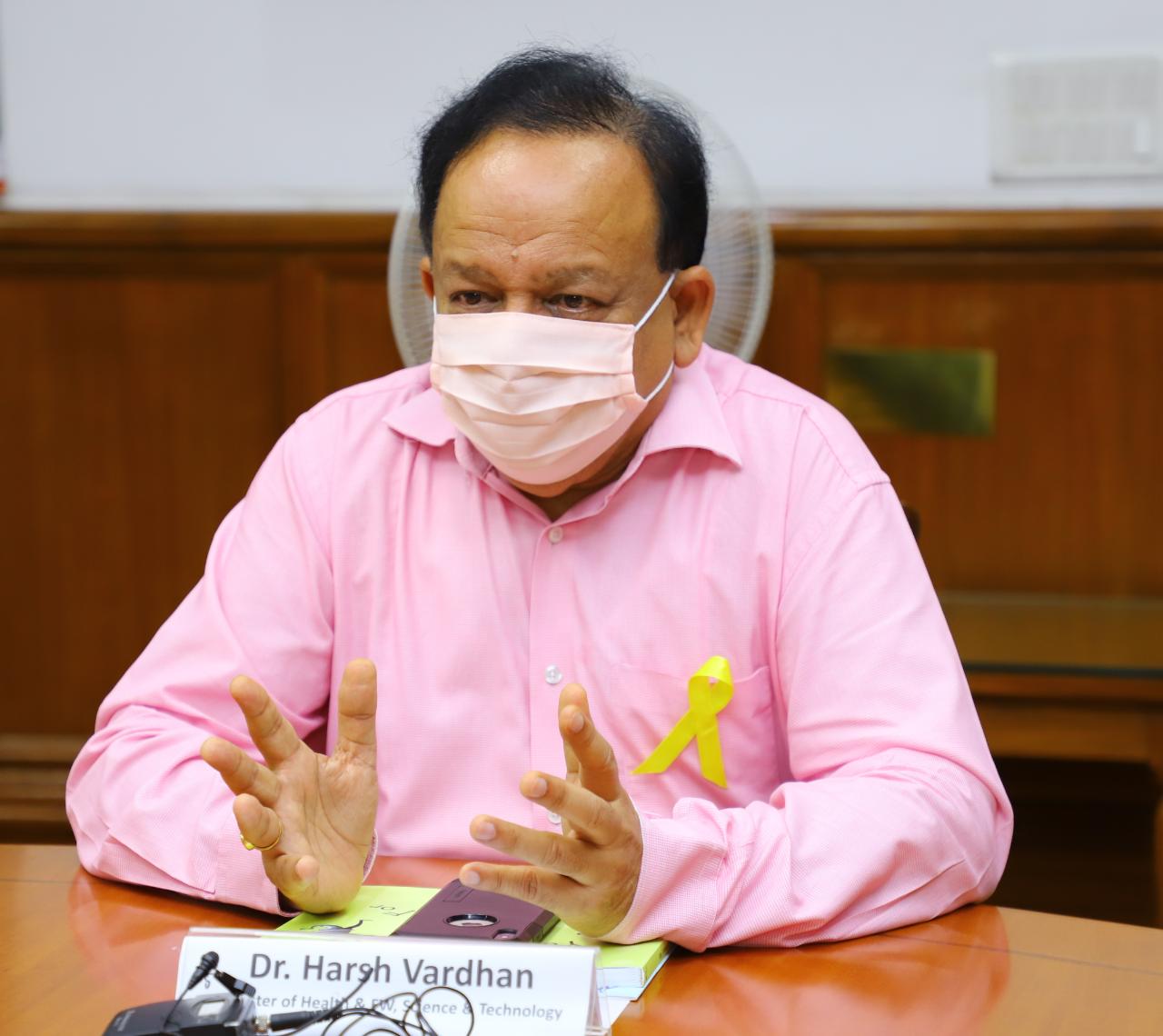Dr Harsh Vardhan addresses The Partnership for Maternal, Newborn and Child Health’s (PMNCH) ‘Accountability Breakfast’
New Delhi: Dr Harsh Vardhan, Union Minister for Health and Family Welfare today participated in the Partnership for Maternal, Newborn and Child Health (PMNCH) ‘Accountability Breakfast’ through Video Conference. The event was co-hosted by the White Ribbon Alliance (WRA) and Every Woman Every Child (EWEC). A recurrent theme this year was the effort to protect hard earned gains in the field of Reproductive, Maternal and Child Health from the COVID pandemic.
Speaking on the impact of COVID-19 in the area of maternal and child health, Dr. Harsh Vardhan observed, “The maximum impact has been felt by women, children and adolescents and this called for urgent action.” He mentioned that at the national level, the Ministry of Health and Family Welfare had issued guidance to the States to ensure that women, children and adolescents continue to get all the healthcare services and that he had personally taken this up with the health ministers of all the States; “We are in a constant dialogue to ensure that these services are made available to women, children and adolescents remain in focus despite the health systems being under severe strain due to COVID epidemic.” The Minister spoke of the government’s stated policy of no denial for essential services, like-Reproductive Maternal Newborn, Child and Adolescent Health (RMNCAH), Tuberculosis, chemotherapy, dialysis and healthcare of the elderly, irrespective of the COVID status, the free testing and treatment for COVID across government health facilities and the inclusion of COVID in the medical conditions covered under the Ayushman Bharat – PM JAY insurance package provided by the government, which caters to almost 500 million people from the weakest socio-economic strata. He expressed satisfaction that these steps have helped in reducing reduce Out-of-Pocket-Expenditure of those affected
Dr. Harsh Vardhan while addressing a question on a women’s choice during maternal care reckoned that maternity care goes much beyond healthcare services for the mothers but sets into motion a lived reality of the woman who depends on a responsive system to cater to her needs of not only services but also dignity, privacy, confidentiality, choice and respect for her as well as her baby; “It is not just about a provider or a client, it’s about human dignity”. Elaborating on the idea, he said “From instilling a behavioral change to help more women deliver in hospitals to entitlement for absolutely free services, we have come a long way now in providing quality care throughout pregnancy and childbirth with interventions like LaQshya and midwifery care.”
He further informed that last year, he had himself started “Safe Motherhood Assurance (SUMAN)” initiative that brings all these services under one umbrella. “We are now following a zero tolerance approach for service denial to pregnant women and their newborn babies and have also strengthened our system for client feedback, grievance redressal and greater accountability and transparency. The idea is to have a fully responsive and accountable health system that will not only result in a positive birthing experience but also help end preventable maternal and newborn deaths,” he added.
The Minister detailed the Government’s plans to expand the notion of safe motherhood beyond mere prevention of mortality, “Women must be empowered to decide for themselves and therefore we have been trying to utilize multiple contact points throughout the antenatal and childbirth period to help women make informed decisions around safe motherhood practices, choice of birth companion, identifying referral transport and post-partum contraception.” He mentioned that India is transitioning “towards a phase of moderate levels of maternal mortality and analyses have shown that many of the maternal deaths occur due to delay in timely provision of comprehensive obstetric care” which could have been prevented. He also added that he believed that with better quality of public healthcare facilities, regular caesarean section audits, adherence to SOPs in the labour room through structured interventions, India will be able to effectively address this issue. Another important step towards universalization of skilled birth care, the Minister outlined, “is making available adequate number of nurse practitioners in India” He said that the Ministry has already prepared a detailed roadmap with an aim to provide midwifery services throughout the country.
The Minister impressed upon the idea to protect primary health care workers from the pandemic, “We have taken actions to create a safer work environment for our COVID warriors through uninterrupted supply of essential logistics, personal protective gear and also made provision of life insurance cover for the people dedicated to COVID and healthcare services. We have also been carrying out a spirited campaign to celebrate the Corona warriors and address stigma and discrimination that has come to be associated with this disease. I would say that this is not a single department’s effort, it is actually a whole of government approach that is helping us deliver to the last mile.”
Committing India to the PMNCH Call to Action, he reminded everyone present that India was one of the countries that was instrumental in shaping this PMNCH Call to Action. “We reiterate our commitment to the women, children and adolescents of India and we will continuously direct our efforts towards improving their health and well-being.” He urged the wider PMNCH community to state and commit their support and resources towards this Call to Action and greater good: “Let’s ensure health for all and that no one is left behind.”

